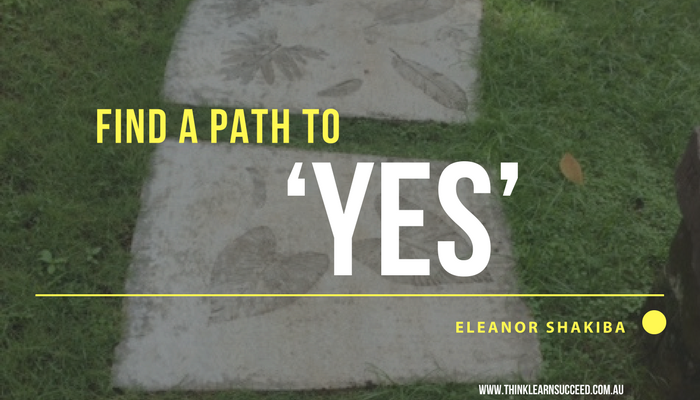
It’s a frustrating situation. During a high-stakes negotiation, your counterpart shoots down every idea you put on the table. They respond to every suggestion you make with a resounding ‘no’. They definitely don’t seem to know how to disagree without being disagreeable. Oh dear. This behaviour can really bog down a negotiation and create a stalemate.
Fortunately, a concept from Positive Psychology can help move conversations beyond ‘no’. It’s the idea that mindsets matter. Put simply, mindset is the way you perceive your world. The mindset you adopt influences how you interpret events and the approach you take to handling problems. Psychologists have shown that there are two key mindsets that people tend to adopt in difficult situations. The first is the fixed mindset and the second is the growth mindset.
Individuals with fixed mindsets filter their experiences through a series of limiting beliefs. Their typical thinking patterns include believing that a person’s skills or capabilities are fixed and cannot change. A second core belief associated with the fixed mindset is that others’ successes are threatening A third belief is that collaboration is pointless – after all, their own perspective is the only correct perspective on the situation.
Obviously, someone operating from this mindset will find it difficult to accept that YOU might have valid opinions or perspectives. This is why people with fixed mindsets will reject your ideas and suggestions, without even attempting to explore them. This can be very frustrating if you’re someone who works from a growth mindset.
The growth mindset epitomises the lifelong learner. It is characterised by behaviours such as seeking solutions to problems and enquiring about multiple perspectives on an issue. In an ideal world, every negotiator would operate from a growth mindset. The reality is that sometimes you need to prompt your negotiation counterpart to shift into a growth-oriented perspective. Here are four strategies savvy female negotiators use in this situation.
Free course preview.

SIGN UP FOR YOUR SNEAK PEEK PROGRAM NOW.
Success-savvy strategy 1. Savvy negotiators ask high quality questions. These prompt their counterparts to reflect, learn and shift their positions. Most importantly, highly effective negotiators ask Socratic questions. They know that Socratic questions encourage others to change their own minds. What a great way to build buy-in to the change of mindset!
Success-savvy strategy 2. High-impact negotiators help their counterparts to have ‘ah-ha’ moments. Then they turn those insights into action plans. Truly masterful negotiators use clean language techniques and precision questioning techniques (from NLP) to do this. That’s why all my negotiation skills workshops include modules on these two core skills.
Success-savvy strategy 3. Top-notch female negotiators always notice and verbally tag their counterparts’ emotions. They view feelings as natural – and transient. In other words, they know that someone who is angry right now, can be shifted into a more resourceful state in a few minutes. They use empathic language patterns – such as ‘you think’, or ‘you feel’ frames – to acknowledge emotions. However, they don’t stop at simply tagging emotions. They also move the conversation towards problem solving, by asking high-gain questions. These include questions such as, ‘What would it take for you to feel differently about this?’ Or, ‘How would you feel if we are to do something different?’
Success-savvy strategy 4. Savvy female negotiators focus on solutions. They don’t let the conversation get bogged down in complaints, blaming, or shaming. Instead, they put the spotlight on how to sort things out. They use spotlight questions to do this. You can find out more about these questions in my book, ‘Difficult People Made Easy’. Essentially, they help you expand or narrow the field of your conversation strategically. Thus, they assist with building collaborative dialogues in tough situations.
The bottom line is that savvy negotiators see mindsets as changeable. They are willing to expand their own perspectives, but they are also skilled at helped others to do the same.
About the author of these tips
Eleanor Shakiba has dedicated her career to teaching highly skilled people to be ‘people smart’. She is a well-known Australian trainer and coach, who has helped more than 50,000 professionals to build confidence, presence and influence at work. Eleanor is a lifelong learner and holds qualifications in Social Anthropology, Applied Psychology, Adult Education and Neuro Linguistic Programming.